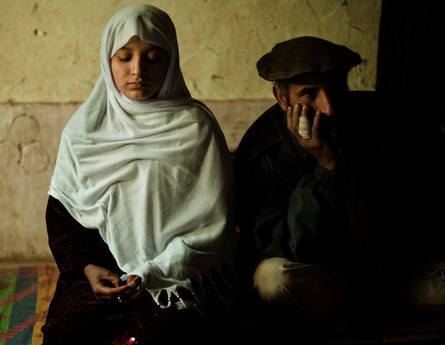By Zabiullah Larawai
When families in some parts of Afghanistan fall out over serious matters, one way of resolving matters is for the offending party to hand over a woman to the other side.
Known as “baad”, the custom involves an arranged marriage between the woman and someone from the injured family. It is seen as a way of avoiding an escalating blood feud which could cost many lives on both side.
But while face is saved, the woman, or often a young girl, finds herself forced into marriage, and her in-laws often take out lingering resentments on her. Human rights activists say the practice is a major cause of domestic violence.
The eastern Kunar province is one area where “baad” is strong. Provincial council member Ustad Toraj says the practice is common, and has hugely negative effects on the women involved.
Farida, from the province’s main town Asadabad, was married off as “compensation” for a crime committed by her brother. He has gone off to join the Afghan army, while Farida has paid the price.

The New York Times, Feb. 16, 2012: Shakila, because one of her uncles had run away with the wife of a district strongman, was taken and held for about a year. “We did not know what was happening,” said Shakila, now about 10, who spoke softly as she repeated over and over her memory of being dragged from her family home. “They put us in a dark room with stone walls; it was dirty and they kept beating us with sticks and saying, ‘Your uncle ran away with our wife and dishonored us, and we will beat you in retaliation.’” (Photo: Andrea Bruce / The New York Times)
“My brother kidnapped a girl, and in recompense for his actions, I was married to a member of the victim’s family,” she told IWPR. “They are always beating me. My husband doesn’t treat me well, and I don’t have a good relationship with my mother- and father-in-law.”
Farida blames her own family, arguing that they could have convened a council to mediate a peace deal, or paid over a sum of money.
“Sometimes I want to commit suicide – jump into the river or set myself on fire - but then I think that it’s OK, this life will pass,” she said.
The men whose families foist a wife on them have little choice in the matter, either.
“One of my brothers was killed. We moved out of the area, but even then the people from our village wouldn’t leave us alone,” Najibullah, 22, said. “They came to us and called an assembly at which they said they’d give us a girl plus 800,000 Pakistani rupees [over 8,000 US dollars] as ‘baad’. The assembly forced the deal on us.”
It was decided that Najibullah should marry the girl, so any chance of him choosing his own wife disappeared, and he finds himself living with a woman who is there only on sufferance. His mother and sisters are always picking fights with her.
“She has come into our home but she’s not really seen as a woman by our family, because whenever we see her, we’re reminded of our late brother. No one treats her well,” he said.
Nasima Shafiq Sadat, head of the provincial women’s affairs department in Kunar, said her office had not recorded a single case of “baad” marriage, although she was well aware it went on.
“The word ‘baad’ has a really negative impact on people; no one should be taunted or insulted for the way they got married,” she said. “It can be really dangerous, driving the girl to commit suicide or to run away.”
Islamic scholar Maulavi Ataurahman says marriages conducted as part of a “baad” transaction have no place in a Muslim society.
“In Islam, such marriages are unlawful,” he said.
Citing principles set down by the Prophet Muhammad, the cleric said, “When a boy and a girl are getting married they should both agree to it…. not like Pashtun families where neither the boy nor the girl knows who they’re marrying.”
Zabiullah Larawai is an IWPR-trained radio reporter in Kunar, Afghanistan.
This report was produced as part of the Afghan Critical Mass Media Reporting in Uruzgan and Nangarharproject, and is also published on the Afghan Centre for Investigative Journalism website which IWPR has set up locally.



